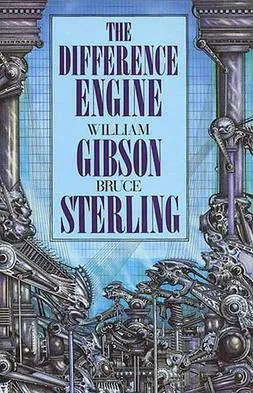Picture it, London, eighteen fifty something. Scoundrels wipe their runny noses on their sleeves, the river Thames cuts a stagnant, gurgling, filthy slurry of industry through the city, and people are going about their duties.
Except, in The Difference Engine things aren't what they would ordinarily seem, for this is a historical fiction story. It's a true steampunk story. It is probably my first reading of a steampunk novel, and I'm not sure that I liked it.
Firstly, on the language and prose itself. This book is very well written, if you're an English professor with an erection for period language. Otherwise, it is thankfully mixed with some contemporary uses of words. Lavish language matches the colourful and vivid descriptions of events and objects fill this book, but that isn't enough to keep a reader interested in story engaged.
It isn't a story in the conventional sense that is told here, but instead a vivid, thriving (and politically roiling) exercise in world building, with characters being a secondary, and third sort of element. Pacing is that of a snail powered by the steam which comes out of my ears as I type this. As in, very slow, because I am not capable of manifesting steam from my ears.
For you see, The Difference Engine imagines a world where mechanical, steam powered computers are able to do thought, illustration and a number of other menial tasks. (If thought is to be considered a menial task.)
The conflict emerges between different political factions, those who are in power, and those that would use reason and technology to advance society further. This revolutionary aspect could've been slightly more detailed to make the political upheaval angle more interesting, as this was really the only time I was truly interested in a few characters, only for them to be blown away by the turning pages.
There's some unmemorable scenes of subterfuge, knife fights, and brawls, and the slow build up of all of these apparently unconnected events leads to a tightly woven conclusion, but for so much of the book, it feels like nothing is actually happening.
As a result, I found this to be an absolute slog. Bogged down by the veracity of its historical setting, the book features too many gratuitous depiction of men visiting upon whore houses, smoking cigars, drinking, getting stabbed, and trying to be heroes that it is exhausting.
Historical figures (most notably, Charles Babbage - actual inventor of the Difference Engine) are named dropped constantly, but there's also a great deal of reference to Colgate, Darwin, and other British technocrats, businessmen and scientific thinkers of the period.
It doesn't do much to elicit more world building, and throughout, I struggled to suspend my disbelief. For the first time in a long time, I've regretted picking up a book.
I'm glad this one is over, and to be very honest, while I like the idea of Steampunk (and was very happy the way in which it featured prominently as the setting of the Dishonored video game franchise) - in this outfit, it makes me ponder as to how the genre become so widespread and loved.
